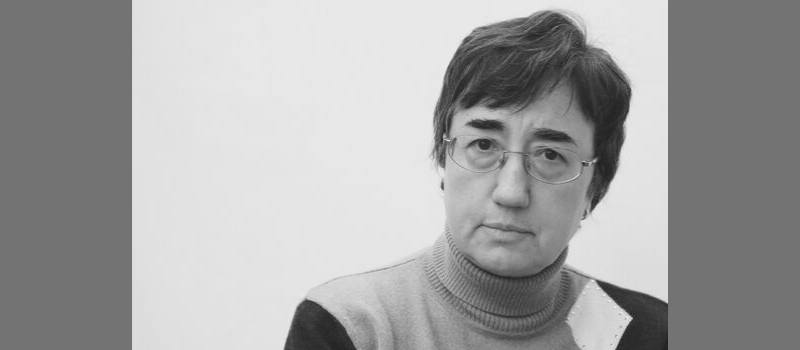(Text and interview by Mireia Martínez i Sellarès)
Pilar Bayer i Isant was born February 13*, 1946 in Barcelona. She is a renowned specialist on number theory and the founder of the Seminari de Teoria de Nombres de Barcelona (Barcelona Number Theory Seminar), which currently gathers internationally acclaimed researchers in the field. Bayer and her high school teacher Griselda Pascual were the first women in the Universitat de Barcelona ever to obtain a PhD in Mathematics, both on 1975 on the same day. The astronomer and mathematician Assumpció Català, one of the first women to obtain a PhD in Science from the Mathematics Section at that university, had just gotten her degree in 1971 –either way, this was less than 50 years ago!
As a young adult Bayer always wanted to dedicate her life to teaching. Her grandparents were school teachers and turns out her grandfather took some courses in mathematics at the Universitat de Barcelona at the end of the 19th century (apparently Pilar only found out about this by coincidence later on in her life). Her dad was a violinist and saxophonist, as well as a saxophone teacher at the Municipal Music Conservatory in Barcelona. Music was a big part of her life since early on: in fact, before obtaining her degree in mathematics at the Universitat de Barcelona (in 1968), she earned the bachelor degree of music in piano by the Municipal Music Conservatory of Barcelona (in 1967).
Just like she had wanted, Pilar started working as a high school teacher after graduating with her bachelor’s in mathematics in 1968. She also worked at the Universitat Autònoma de Barcelona for a while before getting her doctor title, and afterwards she went to Regensburg as a Wissenschaftliche Assistentin under the supervision of the famous mathematician Jürgen Neukirch. She stayed in Regensburg from 1977 to 1980, and after that she worked for one year (1980-1981) at the Universidad de Santander, Spain as an associate professor in Algebra. She held the Algebra chair at the Universitat Autònoma de Barcelona in the academic year 1981-1982, and has held the Algebra chair at the Universitat de Barcelona since 1982. She retired in 2016 –however, she is still active in the Universitat de Barcelona as Emeritus Professor.
She is very fond of having worked abroad at so many institutions for the perspective it gave her. “You know, there are some people who never moved, who started as assistants, sat down on a chair, and have now retired from that exact same chair. Some people will tell me, ‘Ah, but you studied at the Universitat de Barcelona and you are now still here.’ But listen, I have moved so much in between! The vision you have after being abroad is completely different. For example, the course on Group Representations was my suggestion: I have suggested so many new courses and I was always told ‘But why?’, ‘This makes no sense’… I have heard the sentence ‘This makes no sense’ so many times!” Then she adds: “Had I not been to Germany, I wouldn’t have pushed through.”
Her research work touches upon many areas within algebraic number theory. Outside of pure mathematics research, she has also developed important research in history and popularisation of mathematics. In these areas, she wrote a book with Jordi Guàrdia and Artur Travesa, published in 2012 and titled Arrels germàniques de la matemàtica contemporània: una antologia de textos matemàtics de 1850 a 1950 (Germanic roots of contemporary mathematics: an anthology of mathematical texts from 1850 to 1950). One of her most downloaded papers is the one she wrote under petition of the Norwegian Academy of Science and Letters to commemorate Jean-Pierre Serre being awarded the first edition of the Abel Prize, titled Jean-Pierre Serre: An Overview on his Work. Pilar is quite proud of this piece of writing: “You never get paid for any of this [divulgative work]. I do my work with a lot of pleasure, but do you know how many hours of work there are behind this? (Gestures towards the list of publications, books and conferences in her website.) Kilograms and kilograms of conferences and presentations! These articles get downloaded multiple times every week with people sometimes paying up to 30€, and you don’t see any of it.”
Having supervised fifteen PhD thesis and many other undergrad theses, she wanted to make sure we mention them in this text. These are a big source of joy for her: “It’s because I can say I have fifteen [mathematical] sons and daughters! Well, I do have raised one son of my own, but I have invested a lot of time in these fifteen people. And I also have so many [mathematical] grandchildren!” (35 of them, according to the Mathematics Genealogy Project). About the undergraduate theses she says: “I have supervised so many of them, and I had so much fun! It’s a pity that this sort of theses appeared only recently. We have done so many beautiful things! Reading old articles, checking those results with the computer… Oh! So many moments of joy and so much satisfaction!” About being able to work on number theory with the help of a computer to check some of the computations, she says: “For the first four theses I supervised we had no computers yet. And when I got to supervise that fifth one, with a computer… It marked a before and an after! Do you know what difference it makes being able to check your work numerically? In the fifth thesis, we decided to check some conjectures by [Jean-Pierre] Serre: we made some computations here, some computations there… and they didn’t match. Why, you ask? Because we had made a mistake! (Laughs.) We corrected it and let the program run again. The day we checked it for 200 different numbers and all of them came out the way we expected… It was like ‘Ha!’ (Just laughs, pleased.)”
The list of her publications is very long and varied (you can have a look at it all on her website), so we asked her if there was any piece in particular she wanted us to mention. She said, “Probably this article: it is the first one I got published, I was still in Germany. You know, no Spanish researcher had ever gotten an article published in the Inventiones [Mathematicae, a prestigious mathematics research journal] before… So that was the first time, and with an article co-authored by Neukirch!” We asked her what it was like working with a famous mathematician like him: “It was a pleasure, and this had to do a lot with how he was as a person. Had he been arrogant, I would’ve felt very bad. But good mathematicians are very approachable. Those who don’t really do mathematics think they are above everyone else. But those who do, they are open and helpful because they know how hard is to do even the smallest step!” Pilar knows the importance of intuition when doing mathematics. “You have to train your inner feeling. Having ideas is the most important step, later you can process them to make them work properly.” According to her, mathematics is all about “having ideas, making mistakes, then correcting them, then making other mistakes, and correcting them again.”
Pilar might have retired recently, but she is far from planning to stop: she is currently studying jazz piano at the Taller de Músics in Barcelona (her final exam was the Monday after our interview with her took place!), and she studies quantum physics in her free time.
*There is a funny story related to this fact. While preparing the interview, we came across some sources stating that Pilar Bayer was born on February 12, while other said she’d been born on February 13. On the day of the interview we asked her about it, and this is what she explained: “The thing is: I have two birthdays! I was born on February 13 at 1 o’clock in the night. My dad, that same day at 9 in the morning went to the Civil Registry office to register my birth, but the lady at the desk told him ‘You cannot register this child!’ and my dad was like, ‘But why?’ And she said ‘Because you must wait 24 hours to see if the child is normal.’ That was back then… And my dad said: ‘With the amount of screaming and crying she is doing, I’m telling you she is.’ He added: ‘So will I have to come back tomorrow, then?” and she said, ‘Well, if you don’t want to come back tomorrow, we could put in the registration that she was born on the 12th.’ And my dad didn’t hesitate: ‘Oh, as you please!’ (Laughs.) … So, to avoid trouble, on official documents I put that I was born on February 12, but if it’s not an official document, then by all means I say that my birthday is on February 13. I mean, that is my birthday! And it is also the day Dedekind was born! So I don’t want to change it.”


